Hospitality Operations Management Report: Analysis of Britannia Hotel
VerifiedAdded on 2020/10/22
|17
|4411
|453
Report
AI Summary
This report offers a comprehensive analysis of hospitality operations management, using Britannia Hotel as a case study. It begins by examining the nature of the hospitality industry, including the services offered by Britannia Hotel and the significance of tangible and intangible assets, particularly food and beverage services. The report then delves into the factors influencing demand patterns, such as economic conditions, cultural considerations, and seasonality, as well as the expectations and requirements of diverse customer profiles, including spending power and preferences. Furthermore, it explores the stages of service and product development, attributes influencing consumer perception, and the constraints and opportunities affecting product development. The report also addresses pricing methods, revenue generation, and profitability in the hospitality sector, along with performance evaluation techniques, including appraisal methods and their effectiveness. Overall, the report provides valuable insights into the operational aspects of the hospitality industry, offering a thorough understanding of the challenges and opportunities faced by businesses like Britannia Hotel.
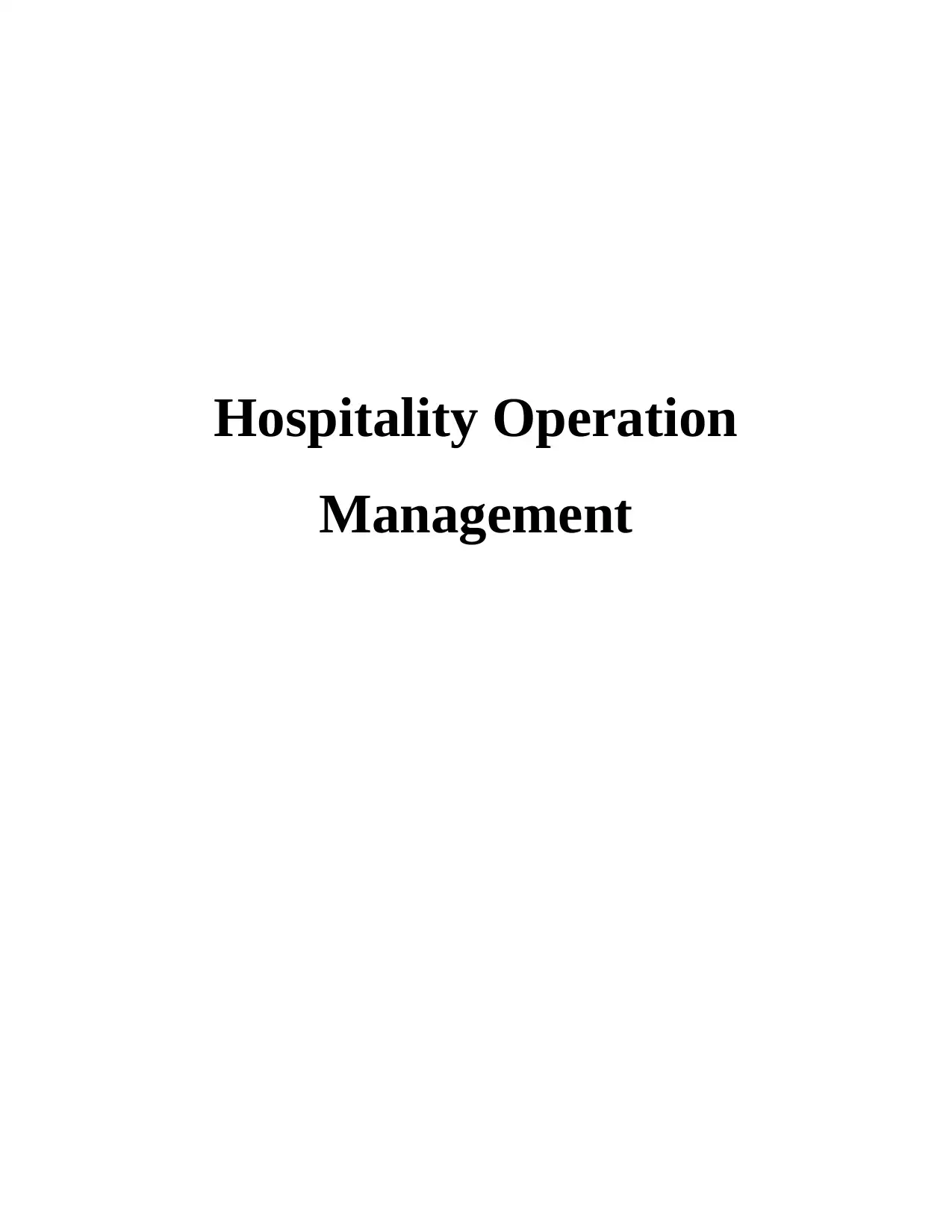
Hospitality Operation
Management
Management
Paraphrase This Document
Need a fresh take? Get an instant paraphrase of this document with our AI Paraphraser
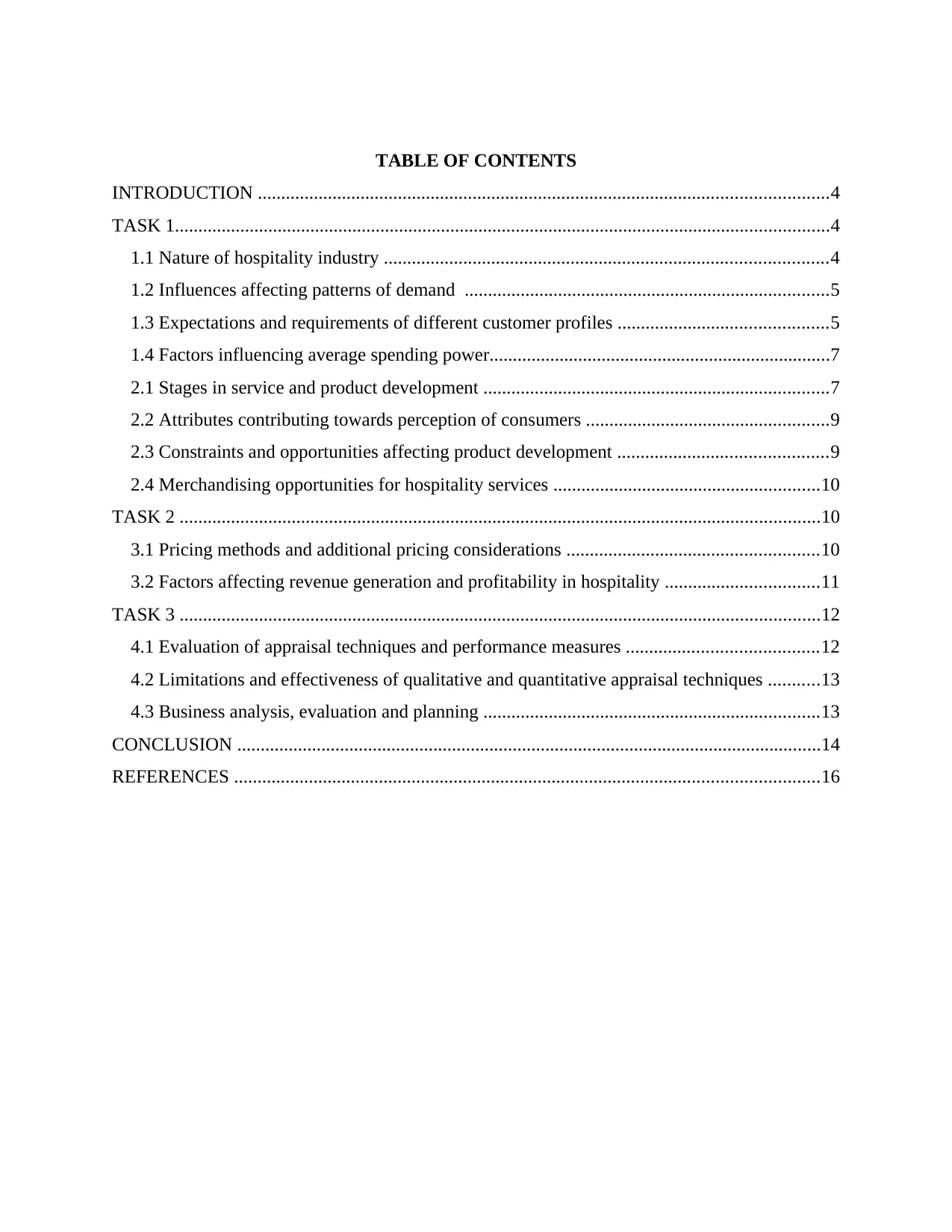
TABLE OF CONTENTS
INTRODUCTION ..........................................................................................................................4
TASK 1............................................................................................................................................4
1.1 Nature of hospitality industry ...............................................................................................4
1.2 Influences affecting patterns of demand ..............................................................................5
1.3 Expectations and requirements of different customer profiles .............................................5
1.4 Factors influencing average spending power.........................................................................7
2.1 Stages in service and product development ..........................................................................7
2.2 Attributes contributing towards perception of consumers ....................................................9
2.3 Constraints and opportunities affecting product development .............................................9
2.4 Merchandising opportunities for hospitality services .........................................................10
TASK 2 .........................................................................................................................................10
3.1 Pricing methods and additional pricing considerations ......................................................10
3.2 Factors affecting revenue generation and profitability in hospitality .................................11
TASK 3 .........................................................................................................................................12
4.1 Evaluation of appraisal techniques and performance measures .........................................12
4.2 Limitations and effectiveness of qualitative and quantitative appraisal techniques ...........13
4.3 Business analysis, evaluation and planning ........................................................................13
CONCLUSION .............................................................................................................................14
REFERENCES .............................................................................................................................16
INTRODUCTION ..........................................................................................................................4
TASK 1............................................................................................................................................4
1.1 Nature of hospitality industry ...............................................................................................4
1.2 Influences affecting patterns of demand ..............................................................................5
1.3 Expectations and requirements of different customer profiles .............................................5
1.4 Factors influencing average spending power.........................................................................7
2.1 Stages in service and product development ..........................................................................7
2.2 Attributes contributing towards perception of consumers ....................................................9
2.3 Constraints and opportunities affecting product development .............................................9
2.4 Merchandising opportunities for hospitality services .........................................................10
TASK 2 .........................................................................................................................................10
3.1 Pricing methods and additional pricing considerations ......................................................10
3.2 Factors affecting revenue generation and profitability in hospitality .................................11
TASK 3 .........................................................................................................................................12
4.1 Evaluation of appraisal techniques and performance measures .........................................12
4.2 Limitations and effectiveness of qualitative and quantitative appraisal techniques ...........13
4.3 Business analysis, evaluation and planning ........................................................................13
CONCLUSION .............................................................................................................................14
REFERENCES .............................................................................................................................16
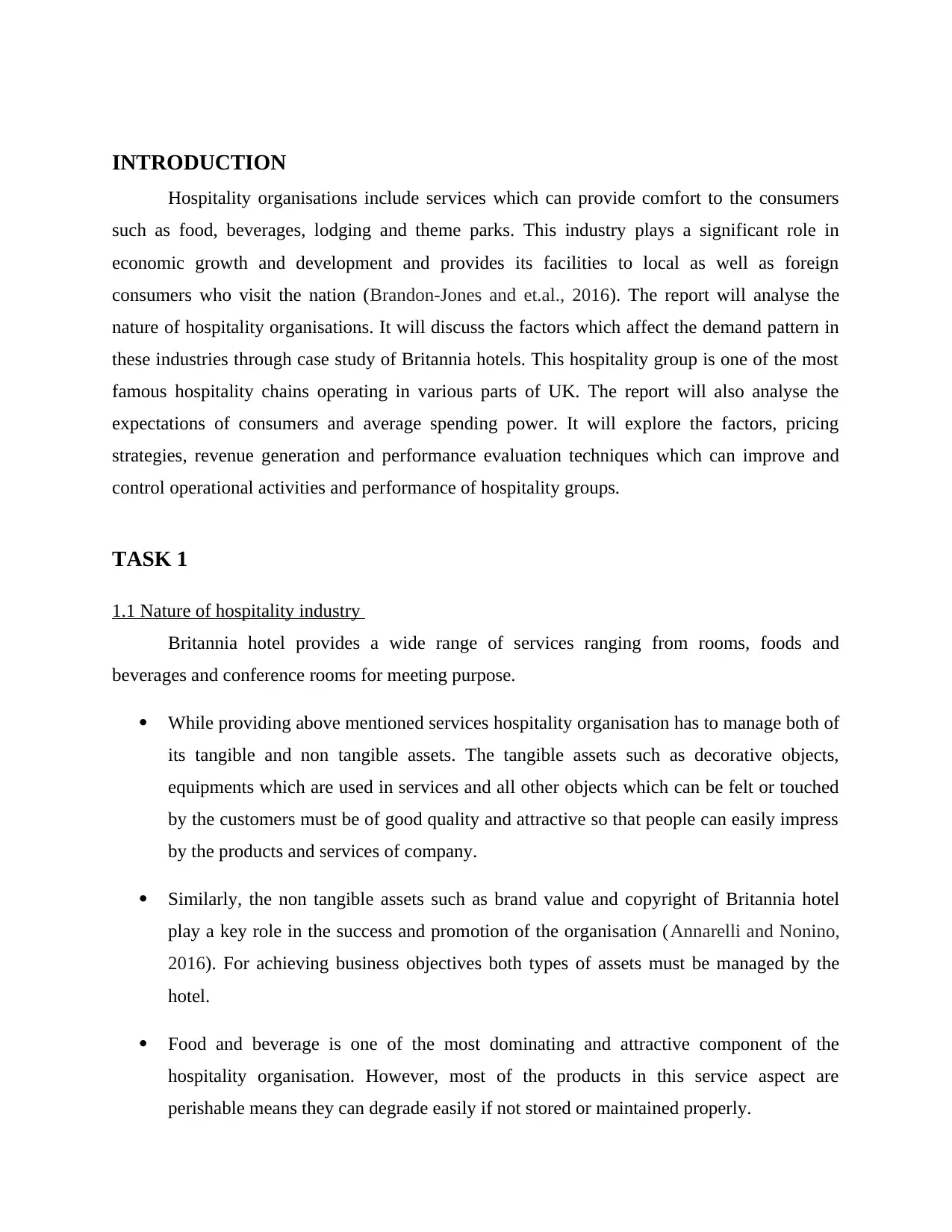
INTRODUCTION
Hospitality organisations include services which can provide comfort to the consumers
such as food, beverages, lodging and theme parks. This industry plays a significant role in
economic growth and development and provides its facilities to local as well as foreign
consumers who visit the nation (Brandon-Jones and et.al., 2016). The report will analyse the
nature of hospitality organisations. It will discuss the factors which affect the demand pattern in
these industries through case study of Britannia hotels. This hospitality group is one of the most
famous hospitality chains operating in various parts of UK. The report will also analyse the
expectations of consumers and average spending power. It will explore the factors, pricing
strategies, revenue generation and performance evaluation techniques which can improve and
control operational activities and performance of hospitality groups.
TASK 1
1.1 Nature of hospitality industry
Britannia hotel provides a wide range of services ranging from rooms, foods and
beverages and conference rooms for meeting purpose.
While providing above mentioned services hospitality organisation has to manage both of
its tangible and non tangible assets. The tangible assets such as decorative objects,
equipments which are used in services and all other objects which can be felt or touched
by the customers must be of good quality and attractive so that people can easily impress
by the products and services of company.
Similarly, the non tangible assets such as brand value and copyright of Britannia hotel
play a key role in the success and promotion of the organisation (Annarelli and Nonino,
2016). For achieving business objectives both types of assets must be managed by the
hotel.
Food and beverage is one of the most dominating and attractive component of the
hospitality organisation. However, most of the products in this service aspect are
perishable means they can degrade easily if not stored or maintained properly.
Hospitality organisations include services which can provide comfort to the consumers
such as food, beverages, lodging and theme parks. This industry plays a significant role in
economic growth and development and provides its facilities to local as well as foreign
consumers who visit the nation (Brandon-Jones and et.al., 2016). The report will analyse the
nature of hospitality organisations. It will discuss the factors which affect the demand pattern in
these industries through case study of Britannia hotels. This hospitality group is one of the most
famous hospitality chains operating in various parts of UK. The report will also analyse the
expectations of consumers and average spending power. It will explore the factors, pricing
strategies, revenue generation and performance evaluation techniques which can improve and
control operational activities and performance of hospitality groups.
TASK 1
1.1 Nature of hospitality industry
Britannia hotel provides a wide range of services ranging from rooms, foods and
beverages and conference rooms for meeting purpose.
While providing above mentioned services hospitality organisation has to manage both of
its tangible and non tangible assets. The tangible assets such as decorative objects,
equipments which are used in services and all other objects which can be felt or touched
by the customers must be of good quality and attractive so that people can easily impress
by the products and services of company.
Similarly, the non tangible assets such as brand value and copyright of Britannia hotel
play a key role in the success and promotion of the organisation (Annarelli and Nonino,
2016). For achieving business objectives both types of assets must be managed by the
hotel.
Food and beverage is one of the most dominating and attractive component of the
hospitality organisation. However, most of the products in this service aspect are
perishable means they can degrade easily if not stored or maintained properly.
⊘ This is a preview!⊘
Do you want full access?
Subscribe today to unlock all pages.

Trusted by 1+ million students worldwide
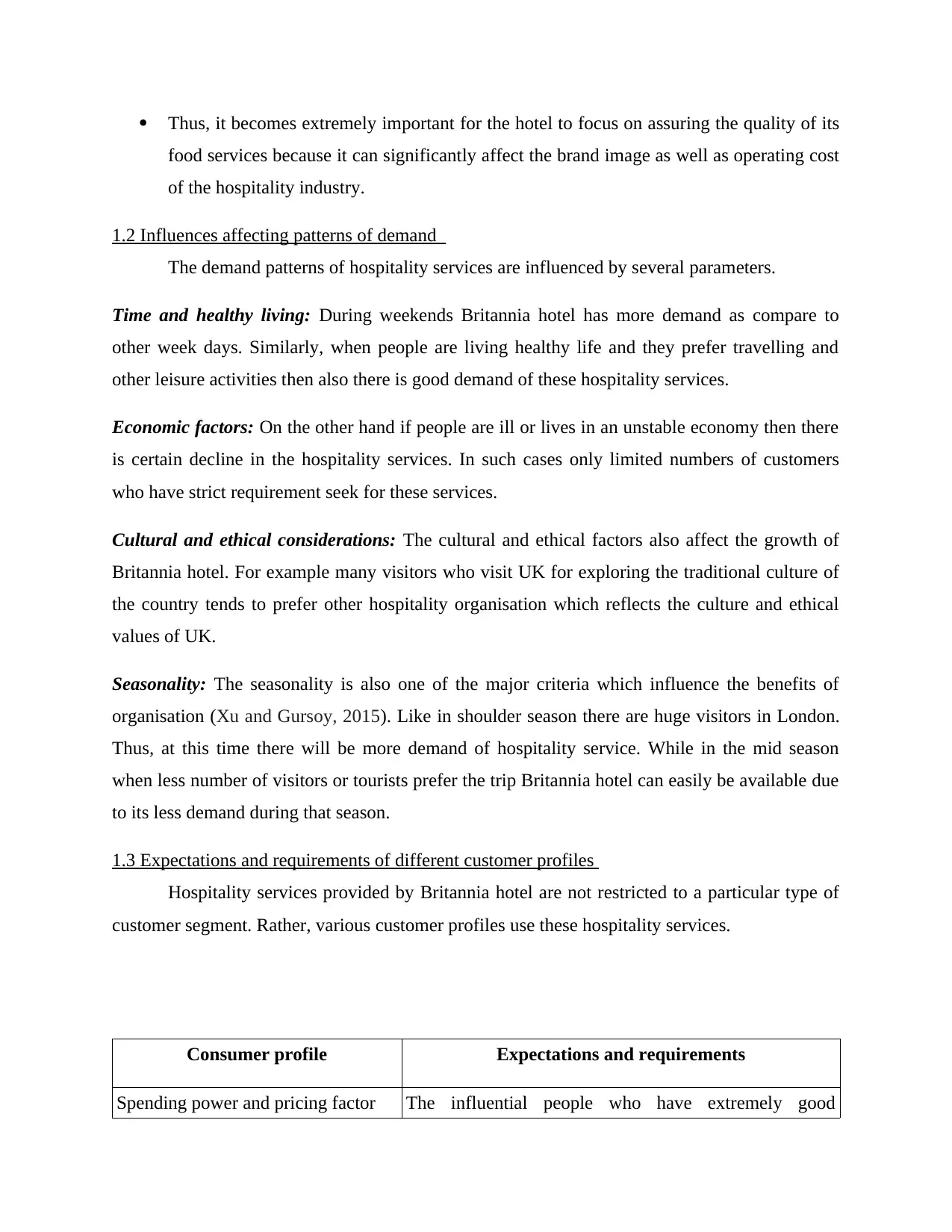
Thus, it becomes extremely important for the hotel to focus on assuring the quality of its
food services because it can significantly affect the brand image as well as operating cost
of the hospitality industry.
1.2 Influences affecting patterns of demand
The demand patterns of hospitality services are influenced by several parameters.
Time and healthy living: During weekends Britannia hotel has more demand as compare to
other week days. Similarly, when people are living healthy life and they prefer travelling and
other leisure activities then also there is good demand of these hospitality services.
Economic factors: On the other hand if people are ill or lives in an unstable economy then there
is certain decline in the hospitality services. In such cases only limited numbers of customers
who have strict requirement seek for these services.
Cultural and ethical considerations: The cultural and ethical factors also affect the growth of
Britannia hotel. For example many visitors who visit UK for exploring the traditional culture of
the country tends to prefer other hospitality organisation which reflects the culture and ethical
values of UK.
Seasonality: The seasonality is also one of the major criteria which influence the benefits of
organisation (Xu and Gursoy, 2015). Like in shoulder season there are huge visitors in London.
Thus, at this time there will be more demand of hospitality service. While in the mid season
when less number of visitors or tourists prefer the trip Britannia hotel can easily be available due
to its less demand during that season.
1.3 Expectations and requirements of different customer profiles
Hospitality services provided by Britannia hotel are not restricted to a particular type of
customer segment. Rather, various customer profiles use these hospitality services.
Consumer profile Expectations and requirements
Spending power and pricing factor The influential people who have extremely good
food services because it can significantly affect the brand image as well as operating cost
of the hospitality industry.
1.2 Influences affecting patterns of demand
The demand patterns of hospitality services are influenced by several parameters.
Time and healthy living: During weekends Britannia hotel has more demand as compare to
other week days. Similarly, when people are living healthy life and they prefer travelling and
other leisure activities then also there is good demand of these hospitality services.
Economic factors: On the other hand if people are ill or lives in an unstable economy then there
is certain decline in the hospitality services. In such cases only limited numbers of customers
who have strict requirement seek for these services.
Cultural and ethical considerations: The cultural and ethical factors also affect the growth of
Britannia hotel. For example many visitors who visit UK for exploring the traditional culture of
the country tends to prefer other hospitality organisation which reflects the culture and ethical
values of UK.
Seasonality: The seasonality is also one of the major criteria which influence the benefits of
organisation (Xu and Gursoy, 2015). Like in shoulder season there are huge visitors in London.
Thus, at this time there will be more demand of hospitality service. While in the mid season
when less number of visitors or tourists prefer the trip Britannia hotel can easily be available due
to its less demand during that season.
1.3 Expectations and requirements of different customer profiles
Hospitality services provided by Britannia hotel are not restricted to a particular type of
customer segment. Rather, various customer profiles use these hospitality services.
Consumer profile Expectations and requirements
Spending power and pricing factor The influential people who have extremely good
Paraphrase This Document
Need a fresh take? Get an instant paraphrase of this document with our AI Paraphraser
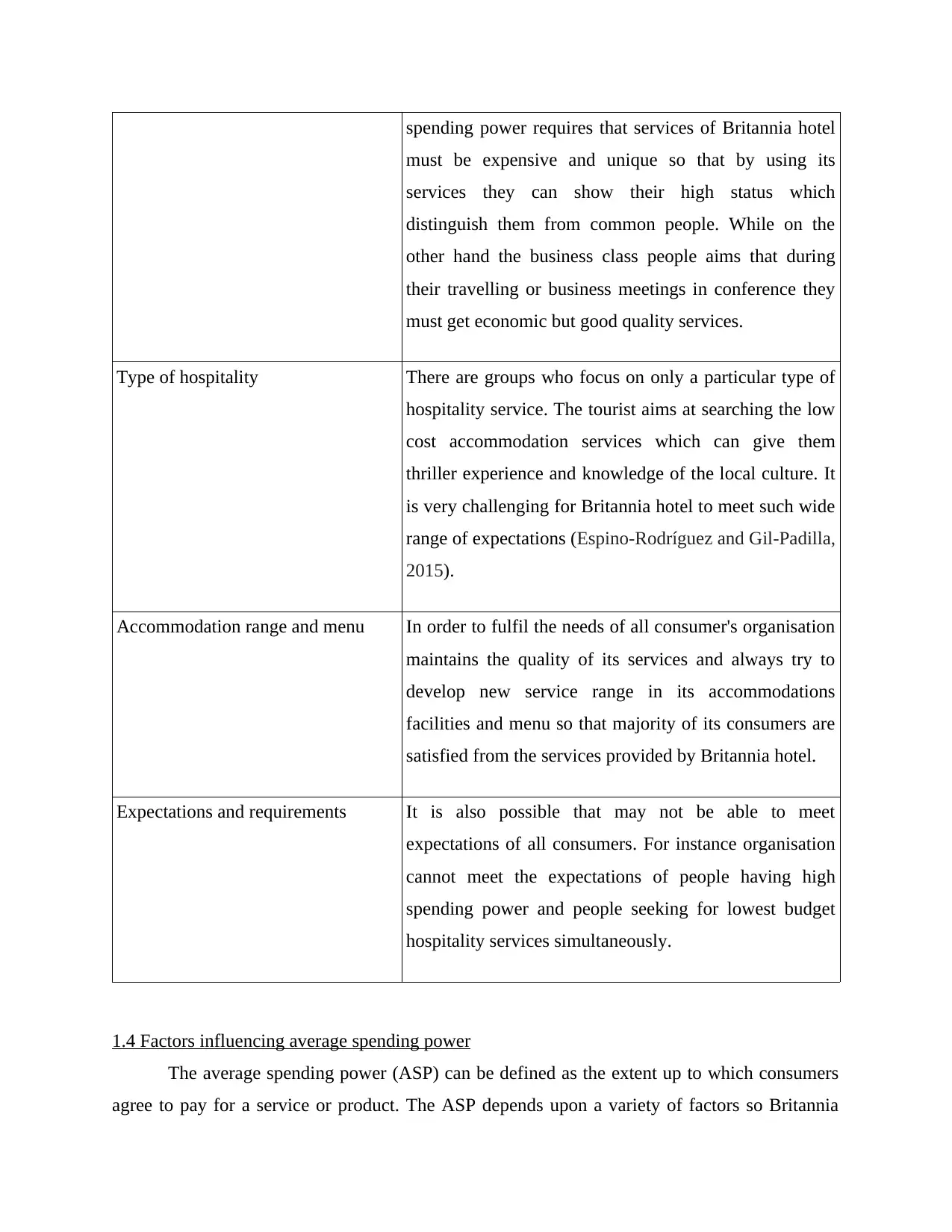
spending power requires that services of Britannia hotel
must be expensive and unique so that by using its
services they can show their high status which
distinguish them from common people. While on the
other hand the business class people aims that during
their travelling or business meetings in conference they
must get economic but good quality services.
Type of hospitality There are groups who focus on only a particular type of
hospitality service. The tourist aims at searching the low
cost accommodation services which can give them
thriller experience and knowledge of the local culture. It
is very challenging for Britannia hotel to meet such wide
range of expectations (Espino-Rodríguez and Gil-Padilla,
2015).
Accommodation range and menu In order to fulfil the needs of all consumer's organisation
maintains the quality of its services and always try to
develop new service range in its accommodations
facilities and menu so that majority of its consumers are
satisfied from the services provided by Britannia hotel.
Expectations and requirements It is also possible that may not be able to meet
expectations of all consumers. For instance organisation
cannot meet the expectations of people having high
spending power and people seeking for lowest budget
hospitality services simultaneously.
1.4 Factors influencing average spending power
The average spending power (ASP) can be defined as the extent up to which consumers
agree to pay for a service or product. The ASP depends upon a variety of factors so Britannia
must be expensive and unique so that by using its
services they can show their high status which
distinguish them from common people. While on the
other hand the business class people aims that during
their travelling or business meetings in conference they
must get economic but good quality services.
Type of hospitality There are groups who focus on only a particular type of
hospitality service. The tourist aims at searching the low
cost accommodation services which can give them
thriller experience and knowledge of the local culture. It
is very challenging for Britannia hotel to meet such wide
range of expectations (Espino-Rodríguez and Gil-Padilla,
2015).
Accommodation range and menu In order to fulfil the needs of all consumer's organisation
maintains the quality of its services and always try to
develop new service range in its accommodations
facilities and menu so that majority of its consumers are
satisfied from the services provided by Britannia hotel.
Expectations and requirements It is also possible that may not be able to meet
expectations of all consumers. For instance organisation
cannot meet the expectations of people having high
spending power and people seeking for lowest budget
hospitality services simultaneously.
1.4 Factors influencing average spending power
The average spending power (ASP) can be defined as the extent up to which consumers
agree to pay for a service or product. The ASP depends upon a variety of factors so Britannia
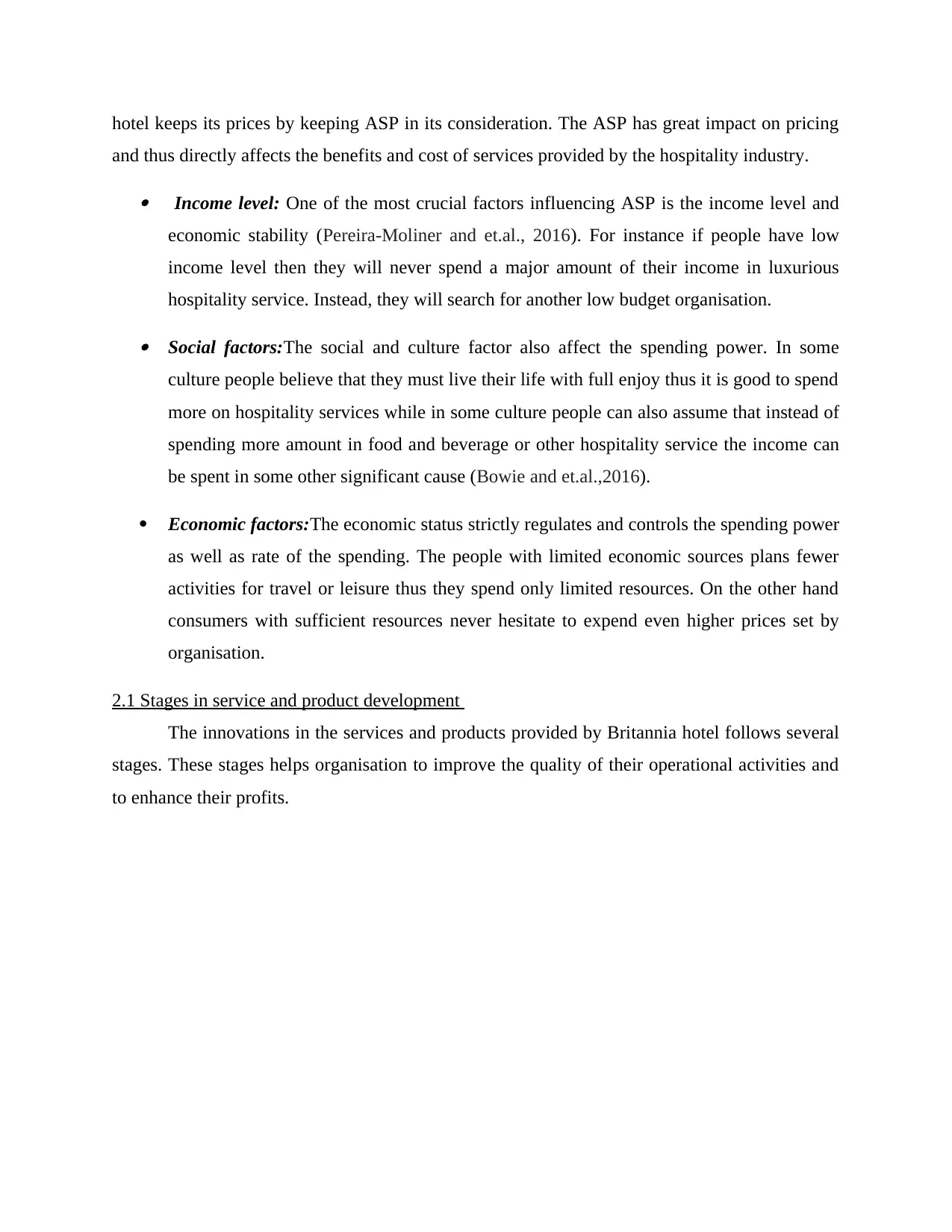
hotel keeps its prices by keeping ASP in its consideration. The ASP has great impact on pricing
and thus directly affects the benefits and cost of services provided by the hospitality industry.
Income level: One of the most crucial factors influencing ASP is the income level and
economic stability (Pereira-Moliner and et.al., 2016). For instance if people have low
income level then they will never spend a major amount of their income in luxurious
hospitality service. Instead, they will search for another low budget organisation.
Social factors:The social and culture factor also affect the spending power. In some
culture people believe that they must live their life with full enjoy thus it is good to spend
more on hospitality services while in some culture people can also assume that instead of
spending more amount in food and beverage or other hospitality service the income can
be spent in some other significant cause (Bowie and et.al.,2016).
Economic factors:The economic status strictly regulates and controls the spending power
as well as rate of the spending. The people with limited economic sources plans fewer
activities for travel or leisure thus they spend only limited resources. On the other hand
consumers with sufficient resources never hesitate to expend even higher prices set by
organisation.
2.1 Stages in service and product development
The innovations in the services and products provided by Britannia hotel follows several
stages. These stages helps organisation to improve the quality of their operational activities and
to enhance their profits.
and thus directly affects the benefits and cost of services provided by the hospitality industry.
Income level: One of the most crucial factors influencing ASP is the income level and
economic stability (Pereira-Moliner and et.al., 2016). For instance if people have low
income level then they will never spend a major amount of their income in luxurious
hospitality service. Instead, they will search for another low budget organisation.
Social factors:The social and culture factor also affect the spending power. In some
culture people believe that they must live their life with full enjoy thus it is good to spend
more on hospitality services while in some culture people can also assume that instead of
spending more amount in food and beverage or other hospitality service the income can
be spent in some other significant cause (Bowie and et.al.,2016).
Economic factors:The economic status strictly regulates and controls the spending power
as well as rate of the spending. The people with limited economic sources plans fewer
activities for travel or leisure thus they spend only limited resources. On the other hand
consumers with sufficient resources never hesitate to expend even higher prices set by
organisation.
2.1 Stages in service and product development
The innovations in the services and products provided by Britannia hotel follows several
stages. These stages helps organisation to improve the quality of their operational activities and
to enhance their profits.
⊘ This is a preview!⊘
Do you want full access?
Subscribe today to unlock all pages.

Trusted by 1+ million students worldwide
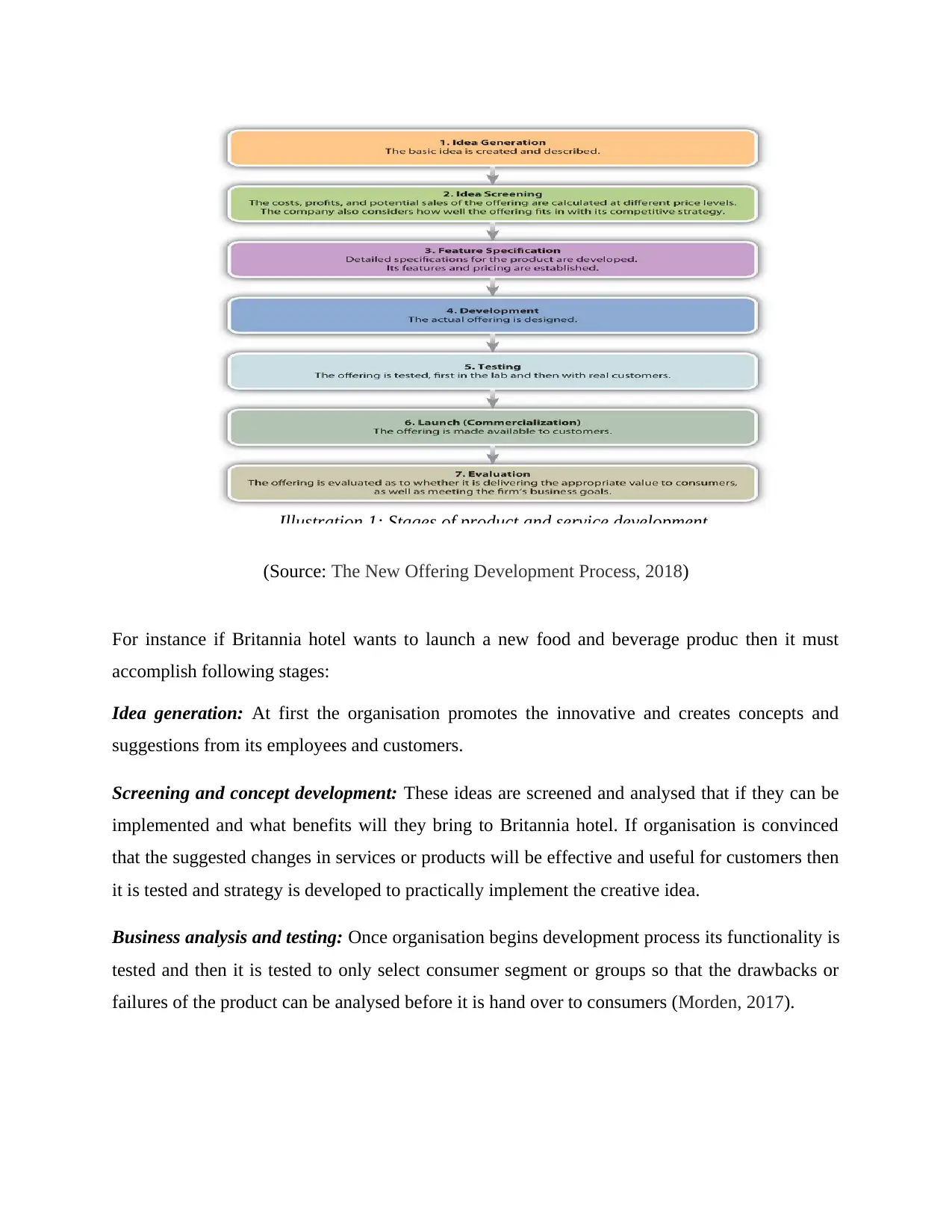
(Source: The New Offering Development Process, 2018)
For instance if Britannia hotel wants to launch a new food and beverage produc then it must
accomplish following stages:
Idea generation: At first the organisation promotes the innovative and creates concepts and
suggestions from its employees and customers.
Screening and concept development: These ideas are screened and analysed that if they can be
implemented and what benefits will they bring to Britannia hotel. If organisation is convinced
that the suggested changes in services or products will be effective and useful for customers then
it is tested and strategy is developed to practically implement the creative idea.
Business analysis and testing: Once organisation begins development process its functionality is
tested and then it is tested to only select consumer segment or groups so that the drawbacks or
failures of the product can be analysed before it is hand over to consumers (Morden, 2017).
Illustration 1: Stages of product and service development
For instance if Britannia hotel wants to launch a new food and beverage produc then it must
accomplish following stages:
Idea generation: At first the organisation promotes the innovative and creates concepts and
suggestions from its employees and customers.
Screening and concept development: These ideas are screened and analysed that if they can be
implemented and what benefits will they bring to Britannia hotel. If organisation is convinced
that the suggested changes in services or products will be effective and useful for customers then
it is tested and strategy is developed to practically implement the creative idea.
Business analysis and testing: Once organisation begins development process its functionality is
tested and then it is tested to only select consumer segment or groups so that the drawbacks or
failures of the product can be analysed before it is hand over to consumers (Morden, 2017).
Illustration 1: Stages of product and service development
Paraphrase This Document
Need a fresh take? Get an instant paraphrase of this document with our AI Paraphraser
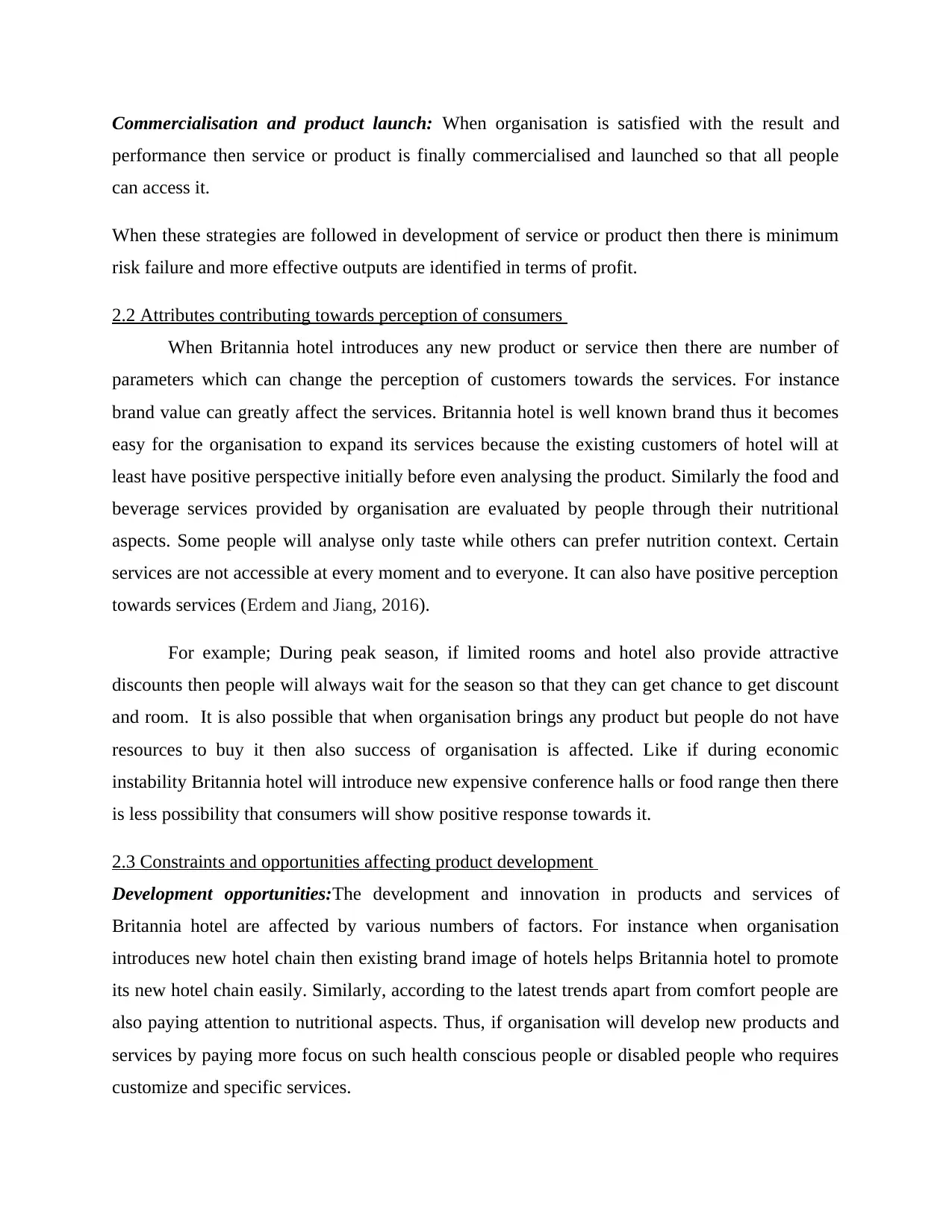
Commercialisation and product launch: When organisation is satisfied with the result and
performance then service or product is finally commercialised and launched so that all people
can access it.
When these strategies are followed in development of service or product then there is minimum
risk failure and more effective outputs are identified in terms of profit.
2.2 Attributes contributing towards perception of consumers
When Britannia hotel introduces any new product or service then there are number of
parameters which can change the perception of customers towards the services. For instance
brand value can greatly affect the services. Britannia hotel is well known brand thus it becomes
easy for the organisation to expand its services because the existing customers of hotel will at
least have positive perspective initially before even analysing the product. Similarly the food and
beverage services provided by organisation are evaluated by people through their nutritional
aspects. Some people will analyse only taste while others can prefer nutrition context. Certain
services are not accessible at every moment and to everyone. It can also have positive perception
towards services (Erdem and Jiang, 2016).
For example; During peak season, if limited rooms and hotel also provide attractive
discounts then people will always wait for the season so that they can get chance to get discount
and room. It is also possible that when organisation brings any product but people do not have
resources to buy it then also success of organisation is affected. Like if during economic
instability Britannia hotel will introduce new expensive conference halls or food range then there
is less possibility that consumers will show positive response towards it.
2.3 Constraints and opportunities affecting product development
Development opportunities:The development and innovation in products and services of
Britannia hotel are affected by various numbers of factors. For instance when organisation
introduces new hotel chain then existing brand image of hotels helps Britannia hotel to promote
its new hotel chain easily. Similarly, according to the latest trends apart from comfort people are
also paying attention to nutritional aspects. Thus, if organisation will develop new products and
services by paying more focus on such health conscious people or disabled people who requires
customize and specific services.
performance then service or product is finally commercialised and launched so that all people
can access it.
When these strategies are followed in development of service or product then there is minimum
risk failure and more effective outputs are identified in terms of profit.
2.2 Attributes contributing towards perception of consumers
When Britannia hotel introduces any new product or service then there are number of
parameters which can change the perception of customers towards the services. For instance
brand value can greatly affect the services. Britannia hotel is well known brand thus it becomes
easy for the organisation to expand its services because the existing customers of hotel will at
least have positive perspective initially before even analysing the product. Similarly the food and
beverage services provided by organisation are evaluated by people through their nutritional
aspects. Some people will analyse only taste while others can prefer nutrition context. Certain
services are not accessible at every moment and to everyone. It can also have positive perception
towards services (Erdem and Jiang, 2016).
For example; During peak season, if limited rooms and hotel also provide attractive
discounts then people will always wait for the season so that they can get chance to get discount
and room. It is also possible that when organisation brings any product but people do not have
resources to buy it then also success of organisation is affected. Like if during economic
instability Britannia hotel will introduce new expensive conference halls or food range then there
is less possibility that consumers will show positive response towards it.
2.3 Constraints and opportunities affecting product development
Development opportunities:The development and innovation in products and services of
Britannia hotel are affected by various numbers of factors. For instance when organisation
introduces new hotel chain then existing brand image of hotels helps Britannia hotel to promote
its new hotel chain easily. Similarly, according to the latest trends apart from comfort people are
also paying attention to nutritional aspects. Thus, if organisation will develop new products and
services by paying more focus on such health conscious people or disabled people who requires
customize and specific services.
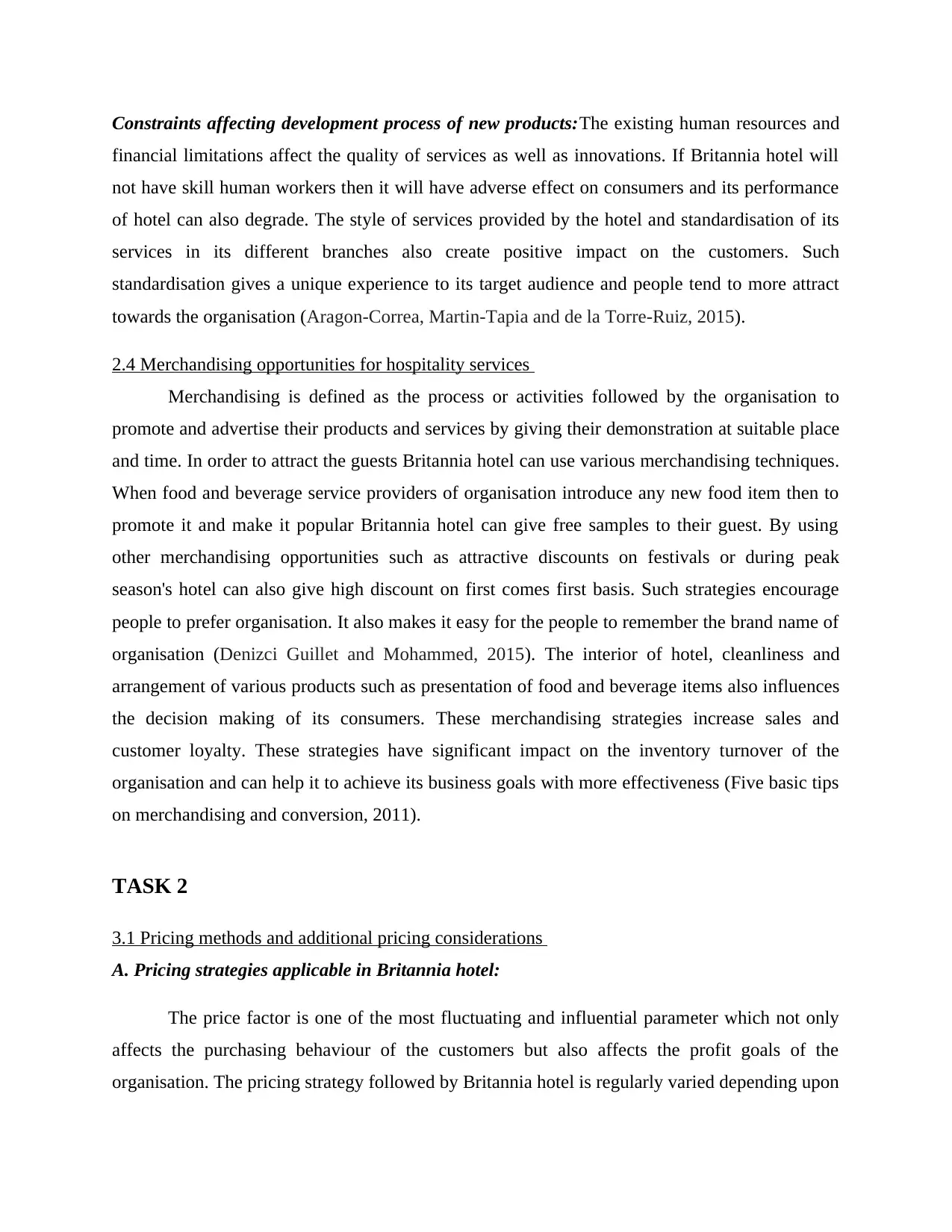
Constraints affecting development process of new products:The existing human resources and
financial limitations affect the quality of services as well as innovations. If Britannia hotel will
not have skill human workers then it will have adverse effect on consumers and its performance
of hotel can also degrade. The style of services provided by the hotel and standardisation of its
services in its different branches also create positive impact on the customers. Such
standardisation gives a unique experience to its target audience and people tend to more attract
towards the organisation (Aragon-Correa, Martin-Tapia and de la Torre-Ruiz, 2015).
2.4 Merchandising opportunities for hospitality services
Merchandising is defined as the process or activities followed by the organisation to
promote and advertise their products and services by giving their demonstration at suitable place
and time. In order to attract the guests Britannia hotel can use various merchandising techniques.
When food and beverage service providers of organisation introduce any new food item then to
promote it and make it popular Britannia hotel can give free samples to their guest. By using
other merchandising opportunities such as attractive discounts on festivals or during peak
season's hotel can also give high discount on first comes first basis. Such strategies encourage
people to prefer organisation. It also makes it easy for the people to remember the brand name of
organisation (Denizci Guillet and Mohammed, 2015). The interior of hotel, cleanliness and
arrangement of various products such as presentation of food and beverage items also influences
the decision making of its consumers. These merchandising strategies increase sales and
customer loyalty. These strategies have significant impact on the inventory turnover of the
organisation and can help it to achieve its business goals with more effectiveness (Five basic tips
on merchandising and conversion, 2011).
TASK 2
3.1 Pricing methods and additional pricing considerations
A. Pricing strategies applicable in Britannia hotel:
The price factor is one of the most fluctuating and influential parameter which not only
affects the purchasing behaviour of the customers but also affects the profit goals of the
organisation. The pricing strategy followed by Britannia hotel is regularly varied depending upon
financial limitations affect the quality of services as well as innovations. If Britannia hotel will
not have skill human workers then it will have adverse effect on consumers and its performance
of hotel can also degrade. The style of services provided by the hotel and standardisation of its
services in its different branches also create positive impact on the customers. Such
standardisation gives a unique experience to its target audience and people tend to more attract
towards the organisation (Aragon-Correa, Martin-Tapia and de la Torre-Ruiz, 2015).
2.4 Merchandising opportunities for hospitality services
Merchandising is defined as the process or activities followed by the organisation to
promote and advertise their products and services by giving their demonstration at suitable place
and time. In order to attract the guests Britannia hotel can use various merchandising techniques.
When food and beverage service providers of organisation introduce any new food item then to
promote it and make it popular Britannia hotel can give free samples to their guest. By using
other merchandising opportunities such as attractive discounts on festivals or during peak
season's hotel can also give high discount on first comes first basis. Such strategies encourage
people to prefer organisation. It also makes it easy for the people to remember the brand name of
organisation (Denizci Guillet and Mohammed, 2015). The interior of hotel, cleanliness and
arrangement of various products such as presentation of food and beverage items also influences
the decision making of its consumers. These merchandising strategies increase sales and
customer loyalty. These strategies have significant impact on the inventory turnover of the
organisation and can help it to achieve its business goals with more effectiveness (Five basic tips
on merchandising and conversion, 2011).
TASK 2
3.1 Pricing methods and additional pricing considerations
A. Pricing strategies applicable in Britannia hotel:
The price factor is one of the most fluctuating and influential parameter which not only
affects the purchasing behaviour of the customers but also affects the profit goals of the
organisation. The pricing strategy followed by Britannia hotel is regularly varied depending upon
⊘ This is a preview!⊘
Do you want full access?
Subscribe today to unlock all pages.

Trusted by 1+ million students worldwide
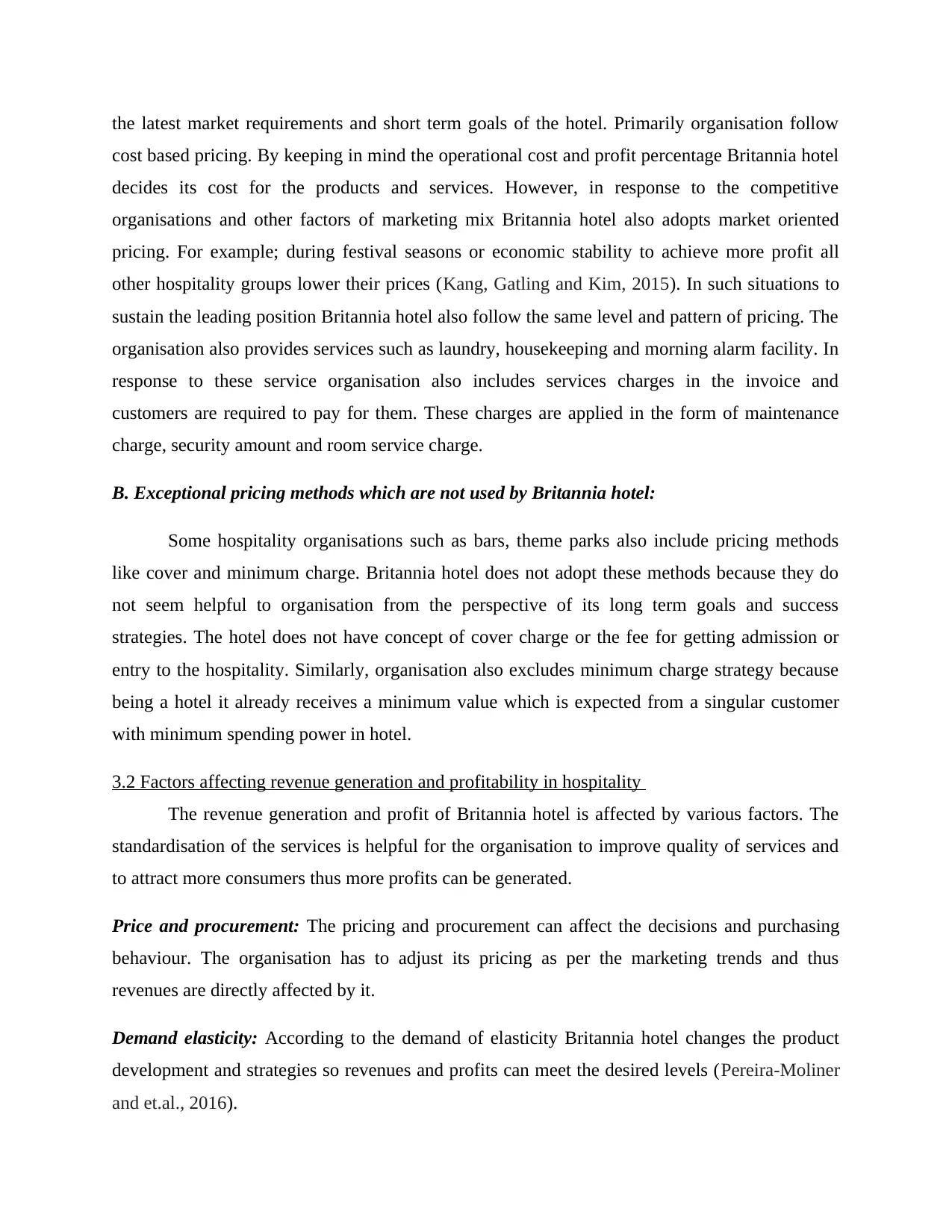
the latest market requirements and short term goals of the hotel. Primarily organisation follow
cost based pricing. By keeping in mind the operational cost and profit percentage Britannia hotel
decides its cost for the products and services. However, in response to the competitive
organisations and other factors of marketing mix Britannia hotel also adopts market oriented
pricing. For example; during festival seasons or economic stability to achieve more profit all
other hospitality groups lower their prices (Kang, Gatling and Kim, 2015). In such situations to
sustain the leading position Britannia hotel also follow the same level and pattern of pricing. The
organisation also provides services such as laundry, housekeeping and morning alarm facility. In
response to these service organisation also includes services charges in the invoice and
customers are required to pay for them. These charges are applied in the form of maintenance
charge, security amount and room service charge.
B. Exceptional pricing methods which are not used by Britannia hotel:
Some hospitality organisations such as bars, theme parks also include pricing methods
like cover and minimum charge. Britannia hotel does not adopt these methods because they do
not seem helpful to organisation from the perspective of its long term goals and success
strategies. The hotel does not have concept of cover charge or the fee for getting admission or
entry to the hospitality. Similarly, organisation also excludes minimum charge strategy because
being a hotel it already receives a minimum value which is expected from a singular customer
with minimum spending power in hotel.
3.2 Factors affecting revenue generation and profitability in hospitality
The revenue generation and profit of Britannia hotel is affected by various factors. The
standardisation of the services is helpful for the organisation to improve quality of services and
to attract more consumers thus more profits can be generated.
Price and procurement: The pricing and procurement can affect the decisions and purchasing
behaviour. The organisation has to adjust its pricing as per the marketing trends and thus
revenues are directly affected by it.
Demand elasticity: According to the demand of elasticity Britannia hotel changes the product
development and strategies so revenues and profits can meet the desired levels (Pereira-Moliner
and et.al., 2016).
cost based pricing. By keeping in mind the operational cost and profit percentage Britannia hotel
decides its cost for the products and services. However, in response to the competitive
organisations and other factors of marketing mix Britannia hotel also adopts market oriented
pricing. For example; during festival seasons or economic stability to achieve more profit all
other hospitality groups lower their prices (Kang, Gatling and Kim, 2015). In such situations to
sustain the leading position Britannia hotel also follow the same level and pattern of pricing. The
organisation also provides services such as laundry, housekeeping and morning alarm facility. In
response to these service organisation also includes services charges in the invoice and
customers are required to pay for them. These charges are applied in the form of maintenance
charge, security amount and room service charge.
B. Exceptional pricing methods which are not used by Britannia hotel:
Some hospitality organisations such as bars, theme parks also include pricing methods
like cover and minimum charge. Britannia hotel does not adopt these methods because they do
not seem helpful to organisation from the perspective of its long term goals and success
strategies. The hotel does not have concept of cover charge or the fee for getting admission or
entry to the hospitality. Similarly, organisation also excludes minimum charge strategy because
being a hotel it already receives a minimum value which is expected from a singular customer
with minimum spending power in hotel.
3.2 Factors affecting revenue generation and profitability in hospitality
The revenue generation and profit of Britannia hotel is affected by various factors. The
standardisation of the services is helpful for the organisation to improve quality of services and
to attract more consumers thus more profits can be generated.
Price and procurement: The pricing and procurement can affect the decisions and purchasing
behaviour. The organisation has to adjust its pricing as per the marketing trends and thus
revenues are directly affected by it.
Demand elasticity: According to the demand of elasticity Britannia hotel changes the product
development and strategies so revenues and profits can meet the desired levels (Pereira-Moliner
and et.al., 2016).
Paraphrase This Document
Need a fresh take? Get an instant paraphrase of this document with our AI Paraphraser
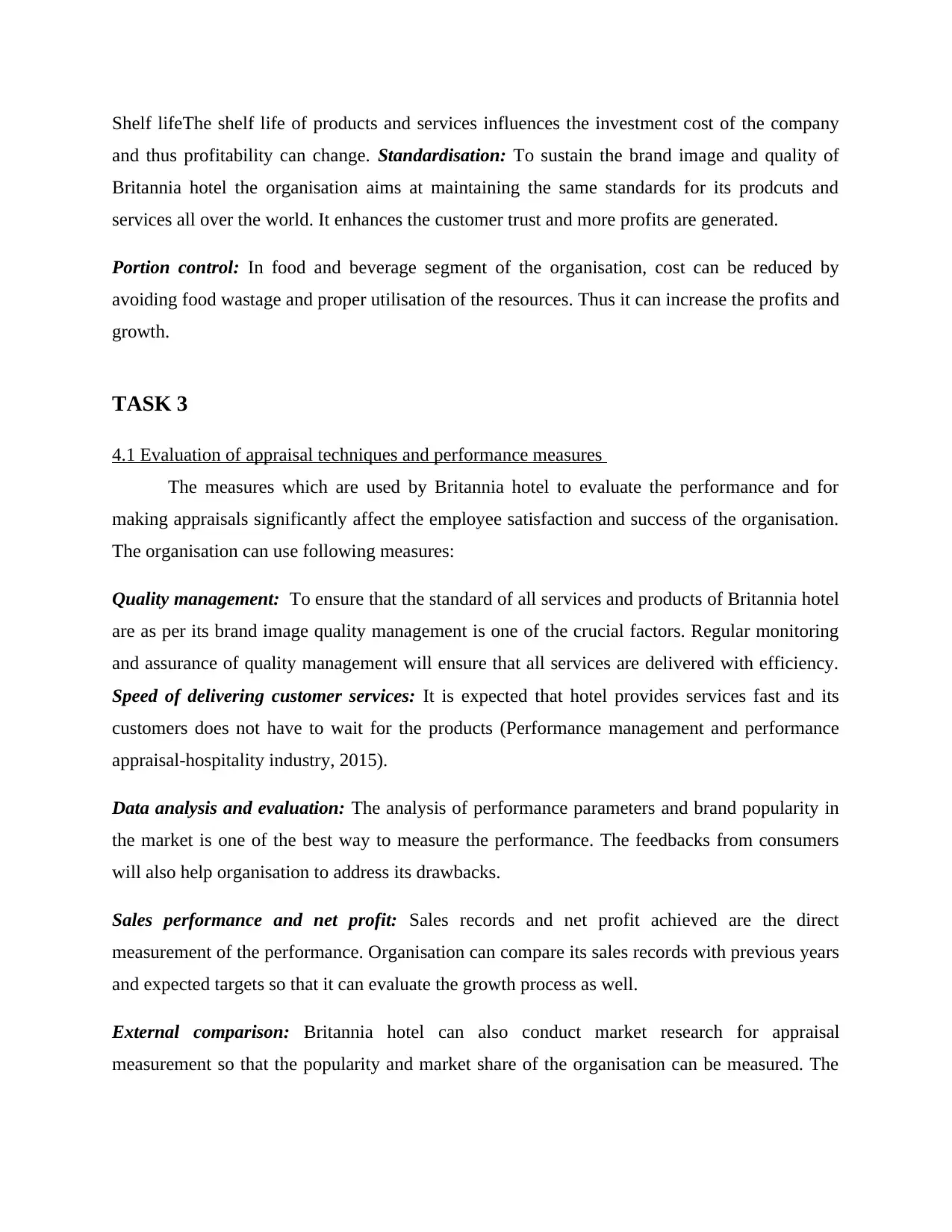
Shelf lifeThe shelf life of products and services influences the investment cost of the company
and thus profitability can change. Standardisation: To sustain the brand image and quality of
Britannia hotel the organisation aims at maintaining the same standards for its prodcuts and
services all over the world. It enhances the customer trust and more profits are generated.
Portion control: In food and beverage segment of the organisation, cost can be reduced by
avoiding food wastage and proper utilisation of the resources. Thus it can increase the profits and
growth.
TASK 3
4.1 Evaluation of appraisal techniques and performance measures
The measures which are used by Britannia hotel to evaluate the performance and for
making appraisals significantly affect the employee satisfaction and success of the organisation.
The organisation can use following measures:
Quality management: To ensure that the standard of all services and products of Britannia hotel
are as per its brand image quality management is one of the crucial factors. Regular monitoring
and assurance of quality management will ensure that all services are delivered with efficiency.
Speed of delivering customer services: It is expected that hotel provides services fast and its
customers does not have to wait for the products (Performance management and performance
appraisal-hospitality industry, 2015).
Data analysis and evaluation: The analysis of performance parameters and brand popularity in
the market is one of the best way to measure the performance. The feedbacks from consumers
will also help organisation to address its drawbacks.
Sales performance and net profit: Sales records and net profit achieved are the direct
measurement of the performance. Organisation can compare its sales records with previous years
and expected targets so that it can evaluate the growth process as well.
External comparison: Britannia hotel can also conduct market research for appraisal
measurement so that the popularity and market share of the organisation can be measured. The
and thus profitability can change. Standardisation: To sustain the brand image and quality of
Britannia hotel the organisation aims at maintaining the same standards for its prodcuts and
services all over the world. It enhances the customer trust and more profits are generated.
Portion control: In food and beverage segment of the organisation, cost can be reduced by
avoiding food wastage and proper utilisation of the resources. Thus it can increase the profits and
growth.
TASK 3
4.1 Evaluation of appraisal techniques and performance measures
The measures which are used by Britannia hotel to evaluate the performance and for
making appraisals significantly affect the employee satisfaction and success of the organisation.
The organisation can use following measures:
Quality management: To ensure that the standard of all services and products of Britannia hotel
are as per its brand image quality management is one of the crucial factors. Regular monitoring
and assurance of quality management will ensure that all services are delivered with efficiency.
Speed of delivering customer services: It is expected that hotel provides services fast and its
customers does not have to wait for the products (Performance management and performance
appraisal-hospitality industry, 2015).
Data analysis and evaluation: The analysis of performance parameters and brand popularity in
the market is one of the best way to measure the performance. The feedbacks from consumers
will also help organisation to address its drawbacks.
Sales performance and net profit: Sales records and net profit achieved are the direct
measurement of the performance. Organisation can compare its sales records with previous years
and expected targets so that it can evaluate the growth process as well.
External comparison: Britannia hotel can also conduct market research for appraisal
measurement so that the popularity and market share of the organisation can be measured. The
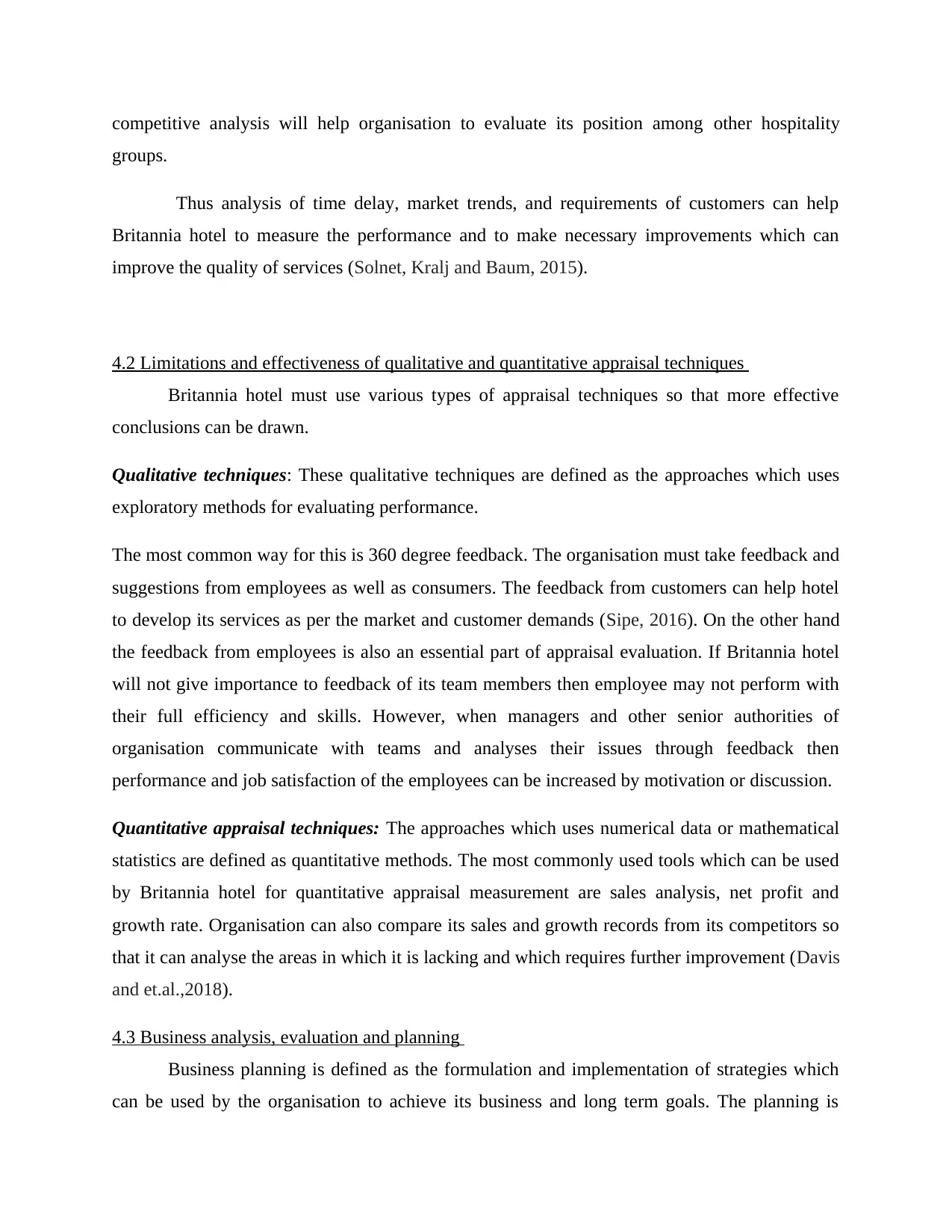
competitive analysis will help organisation to evaluate its position among other hospitality
groups.
Thus analysis of time delay, market trends, and requirements of customers can help
Britannia hotel to measure the performance and to make necessary improvements which can
improve the quality of services (Solnet, Kralj and Baum, 2015).
4.2 Limitations and effectiveness of qualitative and quantitative appraisal techniques
Britannia hotel must use various types of appraisal techniques so that more effective
conclusions can be drawn.
Qualitative techniques: These qualitative techniques are defined as the approaches which uses
exploratory methods for evaluating performance.
The most common way for this is 360 degree feedback. The organisation must take feedback and
suggestions from employees as well as consumers. The feedback from customers can help hotel
to develop its services as per the market and customer demands (Sipe, 2016). On the other hand
the feedback from employees is also an essential part of appraisal evaluation. If Britannia hotel
will not give importance to feedback of its team members then employee may not perform with
their full efficiency and skills. However, when managers and other senior authorities of
organisation communicate with teams and analyses their issues through feedback then
performance and job satisfaction of the employees can be increased by motivation or discussion.
Quantitative appraisal techniques: The approaches which uses numerical data or mathematical
statistics are defined as quantitative methods. The most commonly used tools which can be used
by Britannia hotel for quantitative appraisal measurement are sales analysis, net profit and
growth rate. Organisation can also compare its sales and growth records from its competitors so
that it can analyse the areas in which it is lacking and which requires further improvement (Davis
and et.al.,2018).
4.3 Business analysis, evaluation and planning
Business planning is defined as the formulation and implementation of strategies which
can be used by the organisation to achieve its business and long term goals. The planning is
groups.
Thus analysis of time delay, market trends, and requirements of customers can help
Britannia hotel to measure the performance and to make necessary improvements which can
improve the quality of services (Solnet, Kralj and Baum, 2015).
4.2 Limitations and effectiveness of qualitative and quantitative appraisal techniques
Britannia hotel must use various types of appraisal techniques so that more effective
conclusions can be drawn.
Qualitative techniques: These qualitative techniques are defined as the approaches which uses
exploratory methods for evaluating performance.
The most common way for this is 360 degree feedback. The organisation must take feedback and
suggestions from employees as well as consumers. The feedback from customers can help hotel
to develop its services as per the market and customer demands (Sipe, 2016). On the other hand
the feedback from employees is also an essential part of appraisal evaluation. If Britannia hotel
will not give importance to feedback of its team members then employee may not perform with
their full efficiency and skills. However, when managers and other senior authorities of
organisation communicate with teams and analyses their issues through feedback then
performance and job satisfaction of the employees can be increased by motivation or discussion.
Quantitative appraisal techniques: The approaches which uses numerical data or mathematical
statistics are defined as quantitative methods. The most commonly used tools which can be used
by Britannia hotel for quantitative appraisal measurement are sales analysis, net profit and
growth rate. Organisation can also compare its sales and growth records from its competitors so
that it can analyse the areas in which it is lacking and which requires further improvement (Davis
and et.al.,2018).
4.3 Business analysis, evaluation and planning
Business planning is defined as the formulation and implementation of strategies which
can be used by the organisation to achieve its business and long term goals. The planning is
⊘ This is a preview!⊘
Do you want full access?
Subscribe today to unlock all pages.

Trusted by 1+ million students worldwide
1 out of 17
Related Documents
Your All-in-One AI-Powered Toolkit for Academic Success.
+13062052269
info@desklib.com
Available 24*7 on WhatsApp / Email
![[object Object]](/_next/static/media/star-bottom.7253800d.svg)
Unlock your academic potential
Copyright © 2020–2026 A2Z Services. All Rights Reserved. Developed and managed by ZUCOL.





